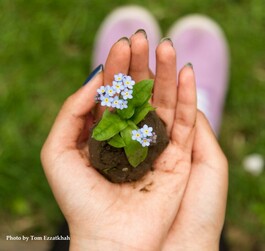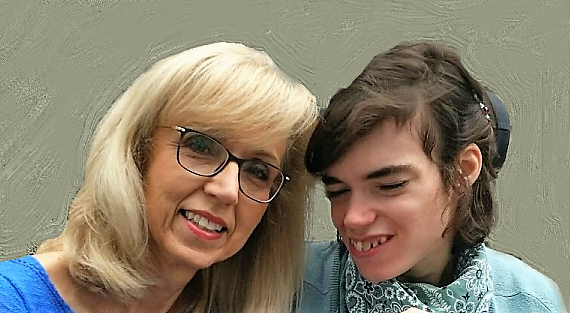 It’s been so lovely lately to wake each morning to the softer breezes of spring days and the brilliant green of budding trees, but unfortunately spring also brings a flurry of paperwork related to Lauren’s continuing ability to live an adult life. In the last week, I’ve been complaining to all who would listen about complicated forms without adequate instructions, the amount of time it takes to gather all of the necessary info every year, and the need to once again prove that Lauren is indeed still disabled. Oh yes, the only miracles occurring here will be if my tulips survive the hungry deer. It is essential that the paperwork necessary to maintain the multiple resources that I coordinate in order for Lauren to live life as an adult be completed. But the time and effort it takes to repeat this process every year seems kind of ridiculous. Nothing substantial changes on the forms, reapplications, and assorted paperwork that I need to submit and—since we are not expecting any miracles—it probably never will. But yet that paperwork must be completed each year requiring submitting multiple forms and supporting documentation to multiple agencies, all with their own set of rules. But as I complain, I feel guilty because, in truth, I should be incredibly grateful. One, because these resources—cumbersome though they may be—are available, and two, because they enable Lauren to spend her days happily and safely in a life that fits her needs and preferences. My need for gratitude has been made very clear to me by the conversations I’ve had in the last few weeks with parents and DSP’s who have related stories of truly unacceptable levels of care that individuals are receiving. My need for gratitude is also prompted by the news reports that continually pop up on my computer screen making my issues with Lauren’s supports pale in comparison with the quality of the supports of others. So, I feel guilty that I have been complaining, because although Lauren’s life is difficult to manage and tenuous in its long term stability, she is safe and secure right now. Right this minute, I know that Lauren is receiving good care in a clean, pleasant home that addresses her physical needs, provides options for her favorite activities and interests, and holds her treasures and photos of family and friends. Right this minute, I am as comfortable with the quality of Lauren’s life as this worrywart of a mother can be. I remain concerned about the future, about finding DSPs in a workforce crisis to continue to provide the quality of care that Lauren needs. I worry about a constantly changing system of supports, and services based primarily on the consistently threatened funding resource of Medicaid. And, how can I not worry—since Lauren’s supports are a complicated and delicate balance of multiple resources—about who will oversee Lauren’s life and manage all of this paperwork when I can no longer do it. But I do not fear for her safety and well being today. Too many other parents cannot say that about their child. Several recent news reports about the supports, or lack of them, provided to individuals with developmental disabilities across the country have been terrible enough to remind me of the expose of Willowbrook reported forty-seven years ago. And just like the excruciatingly slow response to the horrors uncovered in that institution, little is changing in any substantial way for the individuals experiencing inhumane conditions today. In 2016, the Chicago Tribune printed a three part series about the unchecked, unaddressed incidents of abuse and neglect within the Illinois system. In February of this year, the Tribune followed up reporting, “Despite Illinois’ promise to reform troubled group homes for disabled adults, allegations of abuse and neglect have risen, staffing levels have fallen and state oversight has been sluggish...” The Tribune also reported that admissions to institutions have increased despite Human Services administrator’s intent to close those facilities based on the reasoning that “state centers were an antiquated luxury”. I would love to understand their definition of “luxury” and whether anyone living there would describe it using the same words, especially since some of the residents that were moved to group homes were “near death from disease... victims of suspected sexual assault or suffered unexplained injuries”. Here in New Jersey, a few providers have been under scrutiny for substantiated claims of abuse and neglect. and one particular one was in the news again last month despite the fact that a national monitor was brought in last year to review safety and quality of care issues in that organization. The monitor’s report, completed on February 1, has not been released to the public. And, apparently, the issues are still occurring. There are genuinely good providers out there, providing wonderful supports to an extremely diverse population. They are creative, flexible, and doing the best they can with inadequate funding levels and a crisis in the DSP workforce. But there are evidently not enough good ones out there because there are still too many despondent parents struggling to find better care for their children. And distressingly, there are too many parents who feel unable to speak out about inadequate care, because they fear their children will experience retribution and worsening care. In conversations with parents and DSPs in the last few weeks they’ve told me about individuals not being bathed or shaved, spending hours in wet and soiled diapers, being dressed in inadequate clothing or even without underwear. They’ve related unexplained injuries, empty refrigerators in group homes, and over medication or doctor’s orders not followed. And others have experienced days spent in emergency rooms waiting for some provider or some facility willing to provide care. So I feel guilty complaining about what I must do to sustain Lauren’s adult life, and for often being swamped with worry about the unknowns Lauren faces in the future. Too many individuals are suffering today. We parents of children who are well supported and leading decent adult lives must not be complacent, because until all individuals with developmental disabilities are safe, none of our children with developmental disabilities are safe. Until there are consistent outcomes of respectful, safe, and well run options for adult living for all individuals, all of our children are vulnerable. Their living situation could deteriorate because of a change in the system, a change in their needs, or a change in their circumstances. There are no guarantees. And complacency—because today your child is just fine—is a dangerous thing. All parents should be able to know that no matter what, decency and accountability inform the bottom line of service provision of any organization providing supports for their child. It should not just be the good fortune of some. I hope that those of us who can enjoy these spring mornings, because we’ve had a restful night knowing our child is safe and well cared for, will add our voices to those of parents who cannot rest. They need our support. I hope we never need theirs.
0 Comments
|
Gail Frizzellis the author of Special Needs: A Daughter's Disability, A Mother's Mission. Gail is an accomplished advocate and writer in the field of developmental disabilities and Mom to Lauren, a young woman endeavoring to lead her best life despite severe challenges. Archives
September 2019
Categories |

 RSS Feed
RSS Feed